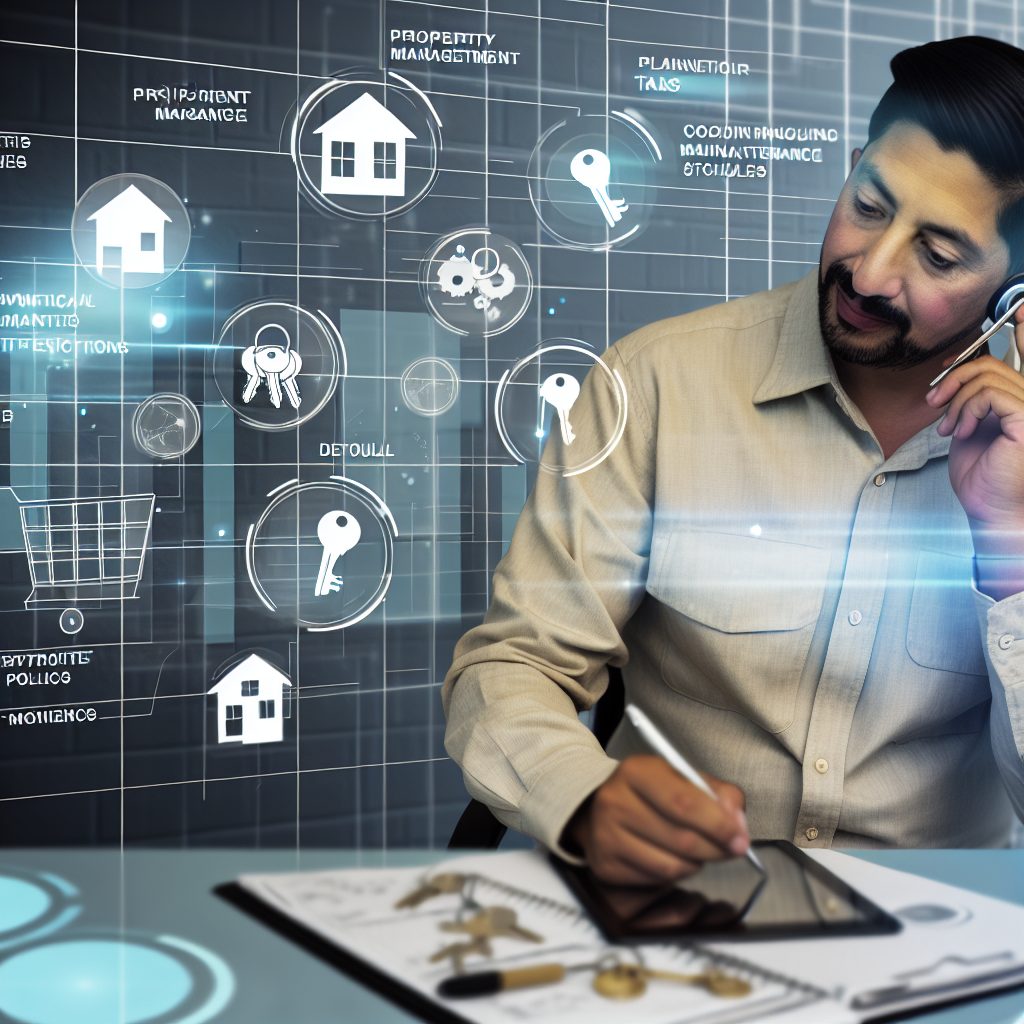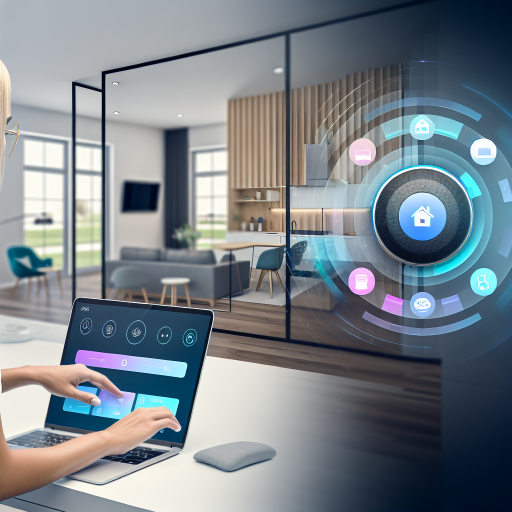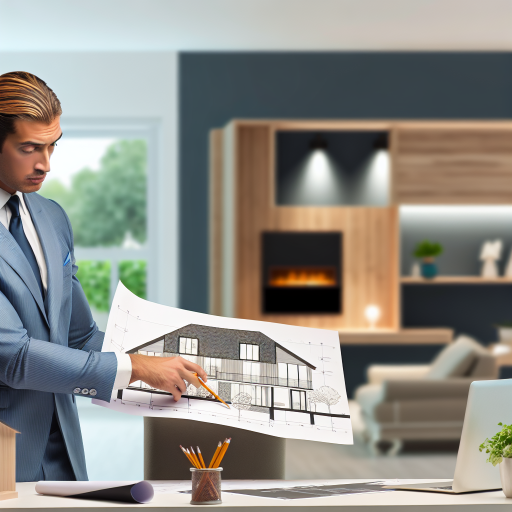Introduction to Smart Home Technology and Its Relevance to Property Management
Smart home technology revolutionizes property management tasks.
This technology offers innovative solutions for landlords and property managers alike.
Automation and connectivity streamline daily operations.
These advancements lead to enhanced efficiency and tenant satisfaction.
Overview of Smart Home Technology
Smart home technology encompasses devices that improve convenience.
For example, smart thermostats adjust temperatures automatically.
Smart locks enhance security with remote access features.
These devices communicate through a central hub, providing real-time data.
Overall, they create a network of interconnected devices within a property.
Benefits for Property Managers
Implementing smart home technology offers numerous advantages.
First, it reduces operational costs significantly.
Second, property managers benefit from real-time monitoring capabilities.
Moreover, automated systems lower the frequency of maintenance issues.
This proactive approach can lead to significant savings over time.
Enhancing Tenant Experience
Smart home technology also enriches the tenant experience.
Tenants appreciate the convenience of smart devices.
For instance, smart lighting adjusts brightness based on occupancy.
This fosters a sense of comfort and control within their living spaces.
Additionally, remote access ensures peace of mind for tenants, especially when they are away.
Challenges and Considerations
While beneficial, integrating smart technology comes with challenges.
Initial installation costs can be a barrier for some property managers.
Moreover, cybersecurity risks must be addressed thoroughly.
Education on technology usage is essential for both managers and tenants.
By overcoming these challenges, property managers can fully harness the benefits.
Key Benefits of Implementing Smart Home Technology in Property Management
Enhanced Efficiency
Smart home technology significantly enhances operational efficiency.
It automates repetitive tasks that consume valuable time.
This leads to quicker responses and improved service quality.
Furthermore, automated systems reduce human error in property management.
Cost Savings
Utilizing smart devices can lead to substantial cost savings.
Smart thermostats optimize heating and cooling, reducing energy bills.
Leak detection systems minimize water waste and repair costs.
Additionally, automation can reduce labor expenses over time.
Improved Tenant Experience
Smart home features significantly enhance tenant satisfaction.
Residents enjoy convenience with smart locks and lighting systems.
Remote controls for these features provide added comfort.
Moreover, tenants appreciate the security that smart technology offers.
Streamlined Maintenance
Smart technology simplifies the maintenance process for property managers.
Automated alerts inform managers of issues before they escalate.
This proactive approach enables timely repairs and reduces downtime.
As a result, overall property condition improves, benefiting all parties.
Data-Driven Decision Making
Smart home technology provides valuable usage data.
Analytics can guide property managers in optimizing operations.
Understanding tenant behavior helps tailor services to meet needs.
Consequently, this data-driven approach fosters better management practices.
Overview of Essential Smart Devices for Streamlining Property Operations
Smart Security Systems
Smart security systems enhance property safety effectively.
They provide real-time monitoring via mobile devices.
Property managers can receive instant alerts about unusual activities.
Additionally, smart locks offer keyless entry for tenants.
This feature minimizes the risk of lost keys and unauthorized access.
Smart Thermostats
Smart thermostats significantly reduce energy costs.
They allow property managers to control heating and cooling remotely.
This capability ensures optimal comfort for tenants.
Moreover, smart thermostats can learn user preferences over time.
This learning leads to more efficient temperature regulation.
Smart Lighting Solutions
Smart lighting solutions boost energy efficiency in properties.
They enable automated scheduling and remote control of lights.
This feature enhances both security and convenience for tenants.
Furthermore, these systems can respond to occupancy sensors.
As a result, lights turn off automatically when rooms are vacant.
Smart Appliances
Smart appliances simplify daily tasks for tenants.
They offer features such as remote monitoring and control.
Tenants can schedule washing machines or refrigerators as needed.
This flexibility contributes to a more satisfactory living experience.
Moreover, property managers can check the status of appliances remotely.
Energy Management Systems
Energy management systems optimize energy usage for properties.
These systems track energy consumption in real time.
This tracking allows property managers to identify inefficiencies easily.
By analyzing data, they can make informed decisions on energy usage.
Ultimately, this contributes to cost savings and sustainability.
Smart Maintenance Alerts
Smart maintenance alerts help streamline property upkeep.
These systems notify property managers of issues as they arise.
For instance, smart sensors detect leaks or temperature fluctuations.
As a result, property managers can address problems proactively.
This proactive approach prolongs the lifespan of property assets.
Explore Further: Leveraging Smart Technology For Real Estate Market Insights In The USA
Integrating Smart Home Technology with Property Management Software
Understanding Smart Home Technology
Smart home technology refers to devices that enhance property management efficiency.
These devices include smart locks, thermostats, lights, and security systems.
Integrating these tools with property management software streamlines operations.
For example, a smart thermostat can automatically adjust climate settings.
Benefits of Integration
Integrating smart home technology offers several benefits for property managers.
First, it improves tenant satisfaction through enhanced convenience.
Tenants enjoy easy access to smart features via mobile apps.
Second, automation reduces manual tasks for property managers.
Consequently, they can focus on more strategic activities.
Popular Integration Methods
Several methods exist to integrate smart technology with property management software.
For instance, API (Application Programming Interface) can facilitate communication.
Moreover, property management platforms often provide built-in integrations.
Another option involves using third-party integration tools for connectivity.
Choosing the Right Smart Devices
Selecting the right devices is crucial for successful integration.
Choose devices that are compatible with your property management software.
Consider the scalability of devices to accommodate future needs.
Additionally, evaluate installation and maintenance requirements before purchase.
Implementation Strategies
Adopting smart home technology requires a strategic implementation plan.
Begin with a pilot program to assess functionality and effectiveness.
Gather feedback from tenants to refine your approach gradually.
Finally, provide training for staff to maximize usage and benefits.
Delve into the Subject: Exploring PropTech Tools Transforming Real Estate Investment Strategies
Case Studies: Successful Implementation of Smart Home Technology in Real Estate
The Smith Property Group
The Smith Property Group streamlined operations through smart technology.
They installed smart thermostats in every building.
This upgrade reduced energy costs by up to 30% annually.
Moreover, they implemented advanced security systems.
This move enhanced tenant safety and provided peace of mind.
The technology also included smart lighting solutions.
These lights adjusted automatically based on occupancy.
As a result, this led to significant utility savings.
Greenwood Apartments
Greenwood Apartments adopted a comprehensive smart home system.
They integrated smart locks for secure, keyless entry.
This feature improved convenience for residents.
Additionally, they utilized smart leak detectors throughout the property.
These detectors alerted management of potential water issues.
Consequently, this proactive measure reduced maintenance costs.
Residents also enjoyed automated temperature control.
This feature ensured comfort and energy efficiency.
Urban Living Spaces
Urban Living Spaces focused on enhancing tenant experiences.
They introduced smart home integrations in their units.
These enhancements included voice-activated assistants.
Residents could control lighting and appliances effortlessly.
Furthermore, they utilized smart window shades.
This innovation minimized heating and cooling expenses.
The management also tracked usage data for optimization.
This data-driven approach improved overall service delivery.
Renaissance Realty Corp.
Renaissance Realty Corp. modernized its rental processes.
They implemented a smart maintenance request system.
Residents submitted issues via a smartphone app.
This streamlined communication and improved response times.
Moreover, they adopted smart surveillance systems.
These systems enhanced on-site security measures.
As a result, incidents decreased significantly over time.
This contributed to a more attractive living environment.
Find Out More: How PropTech Innovations Are Revolutionizing Home Buying In The USA

Challenges and Considerations When Adopting Smart Home Solutions
Integration with Existing Systems
Integrating smart home solutions with current property management systems can be complex.
Property managers must ensure compatibility between new technologies and existing infrastructure.
Inadequate integration may lead to data silos, rendering systems less effective.
Cost Considerations
The initial investment for smart home technology can be substantial.
Property owners need to weigh the upfront costs against potential long-term savings.
Budget constraints may hinder the adoption of some advanced solutions.
Data Security and Privacy
Smart devices often collect vast amounts of data about residents and properties.
This raises significant privacy and security concerns for property managers.
They must implement robust security measures to protect sensitive information.
Employee Training and Adaptation
Employees may require training to effectively use new technologies.
Adopting smart home solutions can shift traditional property management practices.
Organizations must support staff through this transition phase to ensure success.
Managing Vendor Relationships
Choosing the right technology vendors is crucial for successful implementation.
Property managers should conduct thorough research on potential partners.
Effective communication with vendors can enhance the quality of support received.
Regulatory Compliance
Compliance with local, state, and federal regulations is essential when adopting new technologies.
Property managers must stay informed about relevant laws and guidelines.
Failing to comply can result in fines and legal issues down the line.
You Might Also Like: Streamlining Real Estate Processes With PropTech Platforms
Future Trends in Smart Home Technology for Property Management
Integration of AI and Machine Learning
Artificial intelligence continues to revolutionize property management tasks.
Property managers can automate routine processes effectively.
For example, AI can predict maintenance needs before they arise.
Consequently, properties can maintain higher levels of tenant satisfaction.
Machine learning algorithms analyze large datasets for better decision-making.
Enhanced Security Features
Smart home technology significantly improves tenant security.
Advanced surveillance systems monitor properties in real-time.
Smart locks provide controlled access and enhance property safety.
Moreover, remote access allows property managers to respond quickly to issues.
Energy Efficiency and Sustainability
Smart devices contribute to energy conservation in properties.
Energy-efficient appliances reduce utility costs for both tenants and owners.
Additionally, smart thermostats optimize heating and cooling automatically.
Therefore, properties become more appealing to environmentally conscious renters.
Improved Communication Channels
Smart technology facilitates better communication between tenants and managers.
Digital platforms enable instant messaging for addressing concerns efficiently.
This fosters trust and accountability in property management.
As a result, tenant retention rates can substantially increase.
Data-Driven Insights for Better Management
Big data analytics plays a crucial role in property management.
Property managers can track occupancy rates and tenant preferences easily.
This information guides them in making informed decisions for improvements.
Consequently, properties can adapt better to market demands.
Greater Personalization and Customization
Smart home technology allows for personalized tenant experiences.
For instance, tenants can adjust lighting and climate preferences remotely.
This level of customization enhances tenant comfort significantly.
Moreover, tailored services can lead to increased property value.
The Impact of Smart Home Technology on Enhancing Property Value and Tenant Experience
Understanding the Link Between Technology and Property Value
Smart home technology significantly increases property value.
It attracts buyers seeking modern amenities.
Additionally, features like smart thermostats save energy costs.
These features make properties more marketable and desirable.
Enhancing the Tenant Experience
Smart home features greatly improve tenant satisfaction.
Automated lighting creates a comfortable living environment.
Remote-controlled security systems offer peace of mind.
Moreover, smart appliances enhance convenience for tenants.
Increasing Operational Efficiency for Property Managers
Smart technologies streamline property management tasks.
Automated systems help in monitoring maintenance issues.
This reduces response times to tenant requests.
Consequently, property managers can allocate resources effectively.
Future-Proofing Investments Through Smart Technology
Investing in smart home technology prepares properties for the future.
It positions properties competitively in the rental market.
Tenants increasingly prefer homes equipped with technology.
Thus, it’s crucial for property owners to adapt to these trends.
Long-Term Benefits of Smart Home Technology
The integration of smart home technology has lasting benefits.
It enhances property value and elevates tenant experiences.
Moreover, it positions properties favorably in the competitive market.
Embracing smart technology is a strategic investment.
Additional Resources
12 Property Management Technology Trends for 2024 – Rental …
Maximizing Efficiency: The Role of Tech in Streamlining Property …




